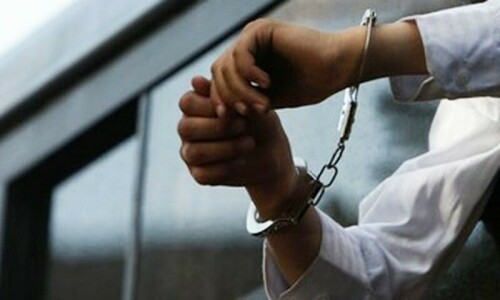 |
| SIUT chairman Prof Adibul Hasan Rizvi speaks at a programme on organ transplant held at Sheikh Zayed Islamic Centre of Karachi University on Wednesday.—White Star |
KARACHI: A grand congregation of religious scholars organised at the Sheikh Zayed Islamic Centre, Karachi University, on Wednesday saw almost everyone except the Council of Islamic Ideology (CII) leadership clearly in favour of organ transplantation.
Most of them also praised the Sindh Institute of Urology and Transplantation for saving lives through its organ donation programme.
However, CII chairman Maulana Mohammad Khan Sherani, who is known for stirring controversies including the one related to DNA evidence in rape cases, discussed everything but failed to give a clear verdict on organ transplantation. Instead he called upon fellow scholars to research certain matters, which, for him, were mandatory to be settled first.
Maulana Sherani said the ulema should delve into another issue first that was whether or not an organ of a Muslim could be transplanted to a non-Muslim; and if an organ of a Muslim was transplanted to a non-Muslim, then would the Muslim’s part would also be punished on the Day of the Judgement with its non-Muslim owner.
He asked several other questions related to organ transplant, telling religious scholars to investigate the issues further.
Then he answered his own primary question with examples. One of them, he elaborated, was that on the Day of Judgement all living creatures would regain their original body parts on the call of divinity. For this reason, it was to be examined if the donation of an organ was allowed in Islam or not, he said. He spoke at length over thousands of recommendations made by the CII and forwarded to the government for legislation in parliament.
Mufti Munibur Rehman, chairman of the federal government’s moon-sighting committee, stuck to the key point of the agenda and clearly said a Muslim’s organ could be transplanted to a non-Muslim and vice versa.
“It is my opinion that a Muslim’s organ could be transplanted to a non-Muslim or vice versa as the body and organs of humans are not Najis and could be used to save human lives,” said the Mufti.
He said different organs of a human body remained alive for a certain period even after death, which could be used and transplanted to another human body to save a life.
“As Maulana Sherani already said,” he added, “all parts of Muslims come to the Muslims again on the Day of Judgement.”
He said any organ that helped survive a human being through transplantation was in accordance with Islam. “The best human being is the one who serves the most humanity and saving lives through transplantation is great service to humanity,” he said after quoting some great scholars.
Jamiat-i-Ulema Pakistan-Noorani president Dr Abul Khair Mohammad Zubair said charity was the deed of prophets and organ transplantation was the greatest charity to save human lives.
“Saving lives can never be against Islam,” he said, asking the CII that it was their primary job to save lives through research and recommendations and get it passed through the parliament.
The organisers had also arranged a video conference in which SIUT director Prof Adibul Hasan Rizvi spoke to Saudi kidney specialist Dr Faisal Shaheen on kidney transplant. Dr Shaheen said the deceased donation programme was successfully being run in the Kingdom of Saudi Arabia for the past 24 years in accordance with a fatwa issued by the country’s ulema in its favour.
Also linked via internet, Dr Mustafa Al-Mousawi, Kuwait’s leading transplant surgeon, told the audience that the role of ulema in many Muslim countries proved highly supportive in increasing transplantation and saving human lives.
Dr Mufti Saleem from Government College University, Faisalabad, said if someone survived through organ transplantation, it was nothing less than saving humanity. Dr Mohsin Naqvi, a visiting professor of Harvard University, said organ transplantation was a means that did not humiliate but respected humanity.
Former CII member Mufti Mohammad Siddique Hazarvi said ulema from across the Islamic jurisprudences should resolve the issue once and for all. Allama Baqar Zaidi said the matter became need of the hour and organ transplantation be used widespread to save lives.
Allama Shehenshah Hussain Naqvi also supported organ transplantation.
Mufti Mohammad Ibrahim, a CII member from Sukkur, was of the opinion that Islam promoted conveniences and Shariah allowed transplantation when one needed that for survival.
However, Mufti Hamadur Rehman Ludhianvi said organ trade was a vicious act. CII secretary Dr Ikramul Haq called for holding human dignity supreme, while Maulana Saqibuddin said SIUT’s programme was a huge effort towards the betterment of humanity.
SZIC director Prof Noor Ahmed Shahtaz welcomed guests and moderated the proceedings.
Published in Dawn, April 9th, 2015
On a mobile phone? Get the Dawn Mobile App: Apple Store | Google Play














































